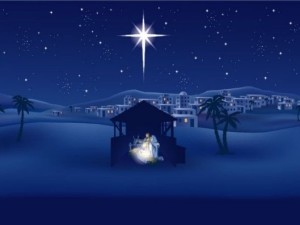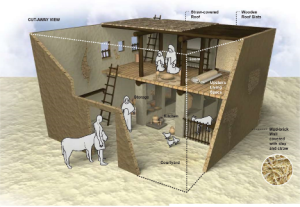Christmas is one of my favorite times of the year and even though things are a little different this year, I am still excited for it. Sure we will not be able to do many of the things we usually do to celebrate, or at least not in the same way. Work Christmas parties are being done via video chat, we can’t go Christmas caroling unless it is with just our own household, many of us will not even see our extended families in person this Christmas. In fact, here in British Columbia, we will not even be able to attend Christmas Eve service at our local church. For many of us, we might feel as if the Grinch has come and tried to steal Christmas.
We definitely will need to celebrate in new ways, ways that we never have before. And it all may seem strange and different. In fact, even though many of us would agree that the reason we celebrate Christmas is to remember the birth of Jesus, we may be asking how we can even do that this Christmas. Maybe some of us are even having a hard time finding Jesus this Christmas. Maybe we’ve asked or are asking the question: “Where can we find Jesus this Christmas?”
I invite you to join me in reading Luke 2:1-20 in the Bible. It’s not the whole Christmas story, but it is part of it and it tells us the part of Jesus’ birth that involved some people called shepherds. As you read this, I encourage you to think about one question: Where did the shepherds find Jesus?
Luke 2:1-20
2 In those days Caesar Augustus issued a decree that a census should be taken of the entire Roman world. 2 (This was the first census that took place while[a] Quirinius was governor of Syria.) 3 And everyone went to their own town to register.
4 So Joseph also went up from the town of Nazareth in Galilee to Judea, to Bethlehem the town of David, because he belonged to the house and line of David. 5 He went there to register with Mary, who was pledged to be married to him and was expecting a child. 6 While they were there, the time came for the baby to be born, 7 and she gave birth to her firstborn, a son. She wrapped him in cloths and placed him in a manger, because there was no guest room available for them.
8 And there were shepherds living out in the fields nearby, keeping watch over their flocks at night. 9 An angel of the Lord appeared to them, and the glory of the Lord shone around them, and they were terrified. 10 But the angel said to them, “Do not be afraid. I bring you good news that will cause great joy for all the people. 11 Today in the town of David a Savior has been born to you; he is the Messiah, the Lord. 12 This will be a sign to you: You will find a baby wrapped in cloths and lying in a manger.”
13 Suddenly a great company of the heavenly host appeared with the angel, praising God and saying,
14 “Glory to God in the highest heaven,
and on earth peace to those on whom his favor rests.”
15 When the angels had left them and gone into heaven, the shepherds said to one another, “Let’s go to Bethlehem and see this thing that has happened, which the Lord has told us about.”
16 So they hurried off and found Mary and Joseph, and the baby, who was lying in the manger. 17 When they had seen him, they spread the word concerning what had been told them about this child, 18 and all who heard it were amazed at what the shepherds said to them. 19 But Mary treasured up all these things and pondered them in her heart. 20 The shepherds returned, glorifying and praising God for all the things they had heard and seen, which were just as they had been told.
So did you see it? Did you see where the Shepherds found Jesus? They foun d him in a manger. In a manger! Now we all know what a manger is, it’s a trough or crib that you can put hay or other animal food in. It is the place where farm animals like cows, goats, and sheep go to eat. And where else would you find the feeding area of a cow, goat, or sheep but in a barn or a stable right? This is why we have Christmas scenes like this.
d him in a manger. In a manger! Now we all know what a manger is, it’s a trough or crib that you can put hay or other animal food in. It is the place where farm animals like cows, goats, and sheep go to eat. And where else would you find the feeding area of a cow, goat, or sheep but in a barn or a stable right? This is why we have Christmas scenes like this.
However, Jesus wasn’t born in modern times. While Jesus still lives today, he wasn’t born today. Jesus was born 2000 years ago (give or take) and what if I told you that a stable or a barn is not where we would find most mangers 2000 years ago. In fact what if I told you that if we lived 2000 years ago we would actually have a manger in our home? Well it’s true! In fact, the majority of people who lived 2000 years ago in ancient Israel would not have been able to afford a Stable or a Barn, but they still would have needed a place to house a sheep or a goat over night.
A house in Je sus’ time would consist of one or two levels, but the lower level or the main floor would be “divided into two parts. The area nearest to the door was levelled and stamped-down dirt, but at the back of the room was a raised platform of stone that was used for family activities such as eating, sitting, and sleeping….Animals…often used the lower floor overnight”[1] And for this reason there would often be a manger built right into the floor of the living are, right next to where the animals were kept.
sus’ time would consist of one or two levels, but the lower level or the main floor would be “divided into two parts. The area nearest to the door was levelled and stamped-down dirt, but at the back of the room was a raised platform of stone that was used for family activities such as eating, sitting, and sleeping….Animals…often used the lower floor overnight”[1] And for this reason there would often be a manger built right into the floor of the living are, right next to where the animals were kept.
So the question then, is if most homes would have a manger, why do we think Jesus was born in a stable? Well, you might say, because the Bible says Jesus was born in a stable. Does it? If we remember what we read earlier, all the Bible really says is that Jesus was “wrapped in cloths and lying in a manger.” There is no mention of a stable.
In Jesus time, the manger in most homes would have been found right in the living room! Jesus was actually born and laid in a manger, right in the living room of that first century house, and probably surrounded by many of Joseph’s extended family. But wait, you might say, that changes the Christmas story. Well, yes it does. It challenges us to open our own living rooms for Jesus, making room for him, not in the barn, not in an inn, but in our own living rooms, right where we live, where our pets are, where we work and sleep, play and eat.[2] During this Christmas, the COVID-19 pandemic has changed some things, but one thing that has not changed, nor ever will is that we don’t need to go outside of our homes to find Jesus. We don’t need to travel to the barn or the stable to see Jesus. If we make room, Jesus will join us in our homes…the BC Medical Health Mandates do not apply to Jesus.
This year I don’t want to think of Jesus lying out in a barn while we are inside warm and safe. Rather, I want to imagine Jesus living in my house as I celebrate. I want to imagine him joining me as I trim the Christmas tree, as I bake and decorate Christmas cookies, as I prepare Christmas dinner, and even as I open Christmas gifts.
I want to imagine him present in my home, not in the barn. After all, he is called Emmanuel which means God With Us, with us on Christmas Eve, with us on Christmas morning, and with us throughout the rest of this year and onward throughout the next.[2]
May we all find Jesus this Christmas, right inside our homes with us, participating in all our activities and all our celebrations.
Amen.
[1] Ralph Gower. The New Manners and Customs of Bible Times. Chicago : Moody Press, 1987, p.32.
[2] Tim Geddert, Treasures, Self-published, p. 89.

 Lurking in the background of the Good Friday story is the betrayal of one man, Judas Iscariot, the keeper of the money bag. Judas, for 30 pieces of silver, betrayed Jesus to the authorities which ultimately resulted in Jesus’ death on that day so long ago that is now commemorated as “Good Friday.” How, in any world, does the act of betrayal leading to an innocent’s death result in a day that is considered good? How, in any world?
Lurking in the background of the Good Friday story is the betrayal of one man, Judas Iscariot, the keeper of the money bag. Judas, for 30 pieces of silver, betrayed Jesus to the authorities which ultimately resulted in Jesus’ death on that day so long ago that is now commemorated as “Good Friday.” How, in any world, does the act of betrayal leading to an innocent’s death result in a day that is considered good? How, in any world?